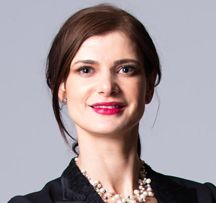Food Systems Podcast 39
In discussion with Galina Peycheva-Miteva and David Wilkinson Podcast summary
Thursday, Jan 20, 2022
Realistic steps towards regenerative ag
Every farm is unique and encouraging farmers to use regenerative practices is about small, easy steps, not a rush into advanced analytics and big data. That was the theme of our first podcast of 2022, in discussion with Galina Peycheva-Miteva, farmer and land manager in Bulgaria, and David Wilkinson, Vice President for Agricultural Procurement, PepsiCo Europe. For a taster, read our short summary below, or dive into the full 27-minute Food Systems Podcast for much more.
There’s a lot of divergence in what regenerative agriculture means to people. What’s your definition?
GP-M: On my farm, it’s a holistic conservation and rehabilitation approach. In particular, a combination of minimum tillage, use of various cover crops targeted towards different goals, rotation of up to seven crops, and significant reduction of fertilizer, substituted by the use of nitrogen and phosphorous-fixing bacteria. This has made us a successful nature positive business. But it took almost 10 years of trial and error.
DW: My view is very similar. It’s around the adoption of farming principles and practices that really seek to improve the farm and field ecosystem. We want to measure benefits like soil health, water quality, watershed health, biodiversity and the amount of carbon we’re sequestering. It’s thinking about the system benefits instead of the March-to-September impact on a specific crop.
Some of these practices are already relatively standard in Europe – so what’s different?
DW: It’s about quantifying the systemic effects and actually looking to measure the improvements of these metrics. Let’s understand the impact. These are not a set of practices that are generic and work across the whole spectrum of farms. The specificity around the uniqueness of every farm and every farmer’s livelihood is really important.
GP-M: Regenerative ag demands regionally specific knowledge that is grounded in the particular crops grown within local climates and it requires trial and error. Trying it on your farm, seeing how it works, what the outcome is, and talking to other farmers.
Are farmers ready to engage with the level of IT management and administration?
GP-M: I don’t think we can quantify regenerative ag by counting worms, for example. The way to make farmers ready is to establish peer to peer groups. Farmers need to see the practices to be convinced that this can work.
DW: Are farmers ready to be the next data scientists? Probably not. But you can encourage people to start to step into the area. It’s not about blinding people with analytics and thousands of data points and algorithms. It’s just to show some very basic improvements and then, in my experience, farmers catch on very quickly with the technology.
Specific carbon goals and sustainability targets do need to be measured and verified. Does the average farmer in Bulgaria have the tools and skills to provide not thousands of data points but even 20 or 30?
GP-M: The average farmer in rural Bulgaria does not have the skill-set for very advanced digitalization. Nevertheless, we see that this is the future and people are trying to catch up.
DW: Data and digitalization will play an absolutely critical part in understanding the activities that are being performed to support crop production. It’s a learning curve.
Is digitalization and regenerative agriculture inclusive or will some farmers and food chain actors be left out because of cost?
GP-M: A lot of farmers are older and have trouble getting used to technology. It’s a trend that will be picked up by the newer generation of farmers. It’s a matter of how we prepare our succession. We have to think how to motivate the new farmers, the new agronomists to be more pro-digital and pro-technology.
DW: I think if regenerative ag and digitalization for farmers ultimately ends up not being inclusive, then we will have failed. It’s not just around age but we need to think about small farmers that might be renting land short-term. When we talk about inclusivity, how do we make it work for them?
Looking at the broad set of practices, which one if the easiest for farmers to start with?
GP-M: Minimum tillage and use of cover crops. This combination can be applied to virtually any farm.
DW: Fully agree with both! Thinking about low-carbon farming, the third element would be to transition to better fertilizers. More organic fertilizers, applied in smarter ways, only applying the right amount of fertilizer.
If you had one piece of advice or one policy suggestion for a much more sustainable food system, what would it be?
DW: Again, touching on low-carbon farming, it would be great to have a coherent approach that appeals to all types of farmers. that incentivizes food to be produced in the right way.
GP-M: I would add that decision-makers in Brussels should establish regenerative farming as a legitimate path towards a sustainable agriculture future and support farmers in the transition.
If you have found this short summary interesting, there’s lots more to hear in the full 27-minute conversation. It is available now on iTunes, Podbean or Spotify or on this website.

Galina Peycheva-Miteva
Galina Peycheva-Miteva studied Econometrics and Statistics in New York and graduated in 2005, when she joined the family farm....see more

David Wilkinson
David Wilkinson is Vice President for Agricultural Procurement, PepsiCo Europe. David has worked for PepsiCo for 21 years and was...see more
